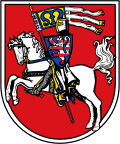Marburg
Marburg is a city in the state of Hesse, Germany, but in the context of medicine, it refers to the Marburg virus, a severe and highly fatal disease caused by a virus from the same family as the one that causes Ebola virus disease.
Overview[edit]
The Marburg virus causes Marburg virus disease (MVD), which is a severe and highly fatal disease. The virus is transmitted to people from fruit bats and spreads among humans through human-to-human transmission. The Marburg virus is a member of the Filoviridae family, genus Marburgvirus.
Transmission[edit]
The Marburg virus is transmitted to people from fruit bats and spreads among humans through human-to-human transmission. It can be spread through close contact with the blood, secretions, organs or other bodily fluids of infected animals. In humans, the virus can be spread through direct contact with the blood, secretions, organs or other bodily fluids of infected people, and with surfaces and materials contaminated with these fluids.
Symptoms[edit]
The onset of MVD is sudden, with fever, chills, headache, and myalgia. Nausea, vomiting, chest pain, sore throat, abdominal pain, and diarrhea may also occur. Symptoms become increasingly severe and may include jaundice, inflammation of the pancreas, severe weight loss, delirium, shock, liver failure, and multi-organ dysfunction.
Diagnosis[edit]
Diagnosis of MVD requires laboratory testing to confirm the presence of Marburg virus or Marburg virus RNA or antibodies against Marburg virus in the blood.
Treatment[edit]
There is no specific treatment for MVD. Patients are given supportive care, which includes balancing the patient's fluids and electrolytes, maintaining their oxygen status and blood pressure, and treating them for any complicating infections.
Prevention[edit]
Prevention includes reducing the risk of wildlife-to-human transmission and human-to-human transmission. Health-care workers caring for patients with suspected or confirmed Marburg virus should apply strict infection control precautions.
-
Elisabethkirche
-
Marburg in Braun-Hogenberg
-
Am Grün
-
Marburg
-
Coat of Arms of Marburg
-
Town Hall and Market Place Fountain in Fog
-
Karl Gustav Adolf Knies
-
Adolf Fick
Ad. Transform your life with W8MD's Budget GLP-1 injections from $75


W8MD offers a medical weight loss program to lose weight in Philadelphia. Our physician-supervised medical weight loss provides:
- Weight loss injections in NYC (generic and brand names):
- Zepbound / Mounjaro, Wegovy / Ozempic, Saxenda
- Most insurances accepted or discounted self-pay rates. We will obtain insurance prior authorizations if needed.
- Generic GLP1 weight loss injections from $75 for the starting dose.
- Also offer prescription weight loss medications including Phentermine, Qsymia, Diethylpropion, Contrave etc.
NYC weight loss doctor appointmentsNYC weight loss doctor appointments
Start your NYC weight loss journey today at our NYC medical weight loss and Philadelphia medical weight loss clinics.
- Call 718-946-5500 to lose weight in NYC or for medical weight loss in Philadelphia 215-676-2334.
- Tags:NYC medical weight loss, Philadelphia lose weight Zepbound NYC, Budget GLP1 weight loss injections, Wegovy Philadelphia, Wegovy NYC, Philadelphia medical weight loss, Brookly weight loss and Wegovy NYC
|
WikiMD's Wellness Encyclopedia |
| Let Food Be Thy Medicine Medicine Thy Food - Hippocrates |
Medical Disclaimer: WikiMD is not a substitute for professional medical advice. The information on WikiMD is provided as an information resource only, may be incorrect, outdated or misleading, and is not to be used or relied on for any diagnostic or treatment purposes. Please consult your health care provider before making any healthcare decisions or for guidance about a specific medical condition. WikiMD expressly disclaims responsibility, and shall have no liability, for any damages, loss, injury, or liability whatsoever suffered as a result of your reliance on the information contained in this site. By visiting this site you agree to the foregoing terms and conditions, which may from time to time be changed or supplemented by WikiMD. If you do not agree to the foregoing terms and conditions, you should not enter or use this site. See full disclaimer.
Credits:Most images are courtesy of Wikimedia commons, and templates, categories Wikipedia, licensed under CC BY SA or similar.
Translate this page: - East Asian
中文,
日本,
한국어,
South Asian
हिन्दी,
தமிழ்,
తెలుగు,
Urdu,
ಕನ್ನಡ,
Southeast Asian
Indonesian,
Vietnamese,
Thai,
မြန်မာဘာသာ,
বাংলা
European
español,
Deutsch,
français,
Greek,
português do Brasil,
polski,
română,
русский,
Nederlands,
norsk,
svenska,
suomi,
Italian
Middle Eastern & African
عربى,
Turkish,
Persian,
Hebrew,
Afrikaans,
isiZulu,
Kiswahili,
Other
Bulgarian,
Hungarian,
Czech,
Swedish,
മലയാളം,
मराठी,
ਪੰਜਾਬੀ,
ગુજરાતી,
Portuguese,
Ukrainian





